Zhe Zhao
EvoCodeBench: A Human-Performance Benchmark for Self-Evolving LLM-Driven Coding Systems
Feb 10, 2026Abstract:As large language models (LLMs) continue to advance in programming tasks, LLM-driven coding systems have evolved from one-shot code generation into complex systems capable of iterative improvement during inference. However, existing code benchmarks primarily emphasize static correctness and implicitly assume fixed model capability during inference. As a result, they do not capture inference-time self-evolution, such as whether accuracy and efficiency improve as an agent iteratively refines its solutions. They also provide limited accounting of resource costs and rarely calibrate model performance against that of human programmers. Moreover, many benchmarks are dominated by high-resource languages, leaving cross-language robustness and long-tail language stability underexplored. Therefore, we present EvoCodeBench, a benchmark for evaluating self-evolving LLM-driven coding systems across programming languages with direct comparison to human performance. EvoCodeBench tracks performance dynamics, measuring solution correctness alongside efficiency metrics such as solving time, memory consumption, and improvement algorithmic design over repeated problem-solving attempts. To ground evaluation in a human-centered reference frame, we directly compare model performance with that of human programmers on the same tasks, enabling relative performance assessment within the human ability distribution. Furthermore, EvoCodeBench supports multiple programming languages, enabling systematic cross-language and long-tail stability analyses under a unified protocol. Our results demonstrate that self-evolving systems exhibit measurable gains in efficiency over time, and that human-relative and multi-language analyses provide insights unavailable through accuracy alone. EvoCodeBench establishes a foundation for evaluating coding intelligence in evolving LLM-driven systems.
FaLW: A Forgetting-aware Loss Reweighting for Long-tailed Unlearning
Jan 26, 2026Abstract:Machine unlearning, which aims to efficiently remove the influence of specific data from trained models, is crucial for upholding data privacy regulations like the ``right to be forgotten". However, existing research predominantly evaluates unlearning methods on relatively balanced forget sets. This overlooks a common real-world scenario where data to be forgotten, such as a user's activity records, follows a long-tailed distribution. Our work is the first to investigate this critical research gap. We find that in such long-tailed settings, existing methods suffer from two key issues: \textit{Heterogeneous Unlearning Deviation} and \textit{Skewed Unlearning Deviation}. To address these challenges, we propose FaLW, a plug-and-play, instance-wise dynamic loss reweighting method. FaLW innovatively assesses the unlearning state of each sample by comparing its predictive probability to the distribution of unseen data from the same class. Based on this, it uses a forgetting-aware reweighting scheme, modulated by a balancing factor, to adaptively adjust the unlearning intensity for each sample. Extensive experiments demonstrate that FaLW achieves superior performance. Code is available at \textbf{Supplementary Material}.
CARPE: Context-Aware Image Representation Prioritization via Ensemble for Large Vision-Language Models
Jan 20, 2026Abstract:Recent advancements in Large Vision-Language Models (LVLMs) have pushed them closer to becoming general-purpose assistants. Despite their strong performance, LVLMs still struggle with vision-centric tasks such as image classification, underperforming compared to their base vision encoders, which are often CLIP-based models. To address this limitation, we propose Context-Aware Image Representation Prioritization via Ensemble (CARPE), a novel, model-agnostic framework which introduces vision-integration layers and a context-aware ensemble strategy to identify when to prioritize image representations or rely on the reasoning capabilities of the language model. This design enhances the model's ability to adaptively weight visual and textual modalities and enables the model to capture various aspects of image representations, leading to consistent improvements in generalization across classification and vision-language benchmarks. Extensive experiments demonstrate that CARPE not only improves performance on image classification benchmarks but also enhances results across various vision-language benchmarks. Finally, CARPE is designed to be effectively integrated with most open-source LVLMs that consist of a vision encoder and a language model, ensuring its adaptability across diverse architectures.
Closing the Reality Gap: Zero-Shot Sim-to-Real Deployment for Dexterous Force-Based Grasping and Manipulation
Jan 06, 2026Abstract:Human-like dexterous hands with multiple fingers offer human-level manipulation capabilities, but training control policies that can directly deploy on real hardware remains difficult due to contact-rich physics and imperfect actuation. We close this gap with a practical sim-to-real reinforcement learning (RL) framework that utilizes dense tactile feedback combined with joint torque sensing to explicitly regulate physical interactions. To enable effective sim-to-real transfer, we introduce (i) a computationally fast tactile simulation that computes distances between dense virtual tactile units and the object via parallel forward kinematics, providing high-rate, high-resolution touch signals needed by RL; (ii) a current-to-torque calibration that eliminates the need for torque sensors on dexterous hands by mapping motor current to joint torque; and (iii) actuator dynamics modeling to bridge the actuation gaps with randomization of non-ideal effects such as backlash, torque-speed saturation. Using an asymmetric actor-critic PPO pipeline trained entirely in simulation, our policies deploy directly to a five-finger hand. The resulting policies demonstrated two essential skills: (1) command-based, controllable grasp force tracking, and (2) reorientation of objects in the hand, both of which were robustly executed without fine-tuning on the robot. By combining tactile and torque in the observation space with effective sensing/actuation modeling, our system provides a practical solution to achieve reliable dexterous manipulation. To our knowledge, this is the first demonstration of controllable grasping on a multi-finger dexterous hand trained entirely in simulation and transferred zero-shot on real hardware.
Rethinking Crystal Symmetry Prediction: A Decoupled Perspective
Nov 10, 2025Abstract:Efficiently and accurately determining the symmetry is a crucial step in the structural analysis of crystalline materials. Existing methods usually mindlessly apply deep learning models while ignoring the underlying chemical rules. More importantly, experiments show that they face a serious sub-property confusion SPC problem. To address the above challenges, from a decoupled perspective, we introduce the XRDecoupler framework, a problem-solving arsenal specifically designed to tackle the SPC problem. Imitating the thinking process of chemists, we innovatively incorporate multidimensional crystal symmetry information as superclass guidance to ensure that the model's prediction process aligns with chemical intuition. We further design a hierarchical PXRD pattern learning model and a multi-objective optimization approach to achieve high-quality representation and balanced optimization. Comprehensive evaluations on three mainstream databases (e.g., CCDC, CoREMOF, and InorganicData) demonstrate that XRDecoupler excels in performance, interpretability, and generalization.
Domain Generalization in-the-Wild: Disentangling Classification from Domain-Aware Representations
Aug 29, 2025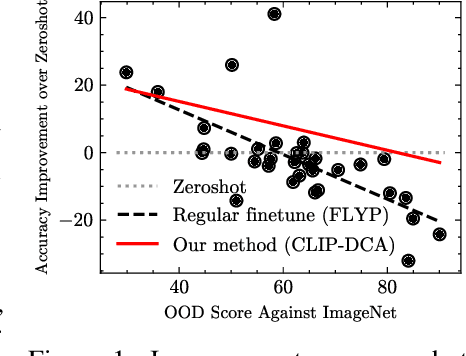
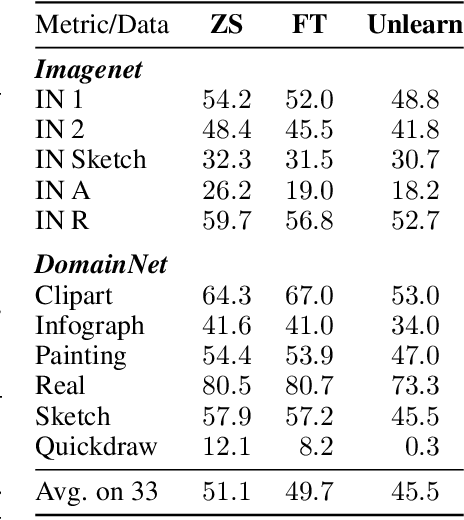
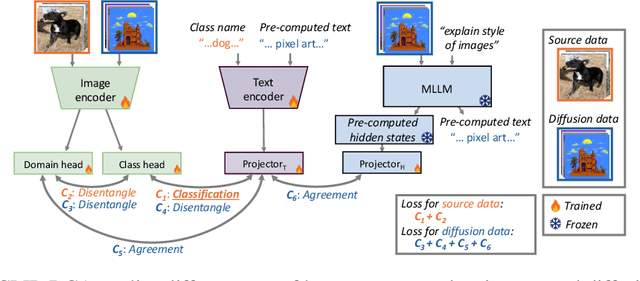
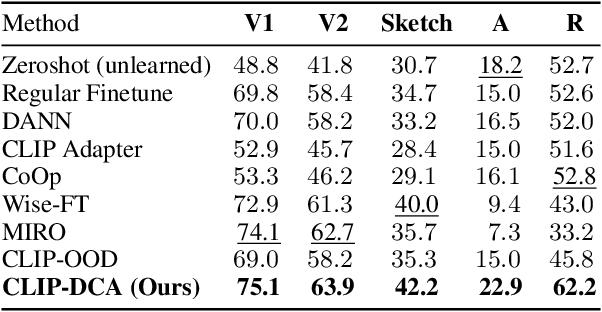
Abstract:Evaluating domain generalization (DG) for foundational models like CLIP is challenging, as web-scale pretraining data potentially covers many existing benchmarks. Consequently, current DG evaluation may neither be sufficiently challenging nor adequately test genuinely unseen data scenarios. To better assess the performance of CLIP on DG in-the-wild, a scenario where CLIP encounters challenging unseen data, we consider two approaches: (1) evaluating on 33 diverse datasets with quantified out-of-distribution (OOD) scores after fine-tuning CLIP on ImageNet, and (2) using unlearning to make CLIP `forget' some domains as an approximation. We observe that CLIP's performance deteriorates significantly on more OOD datasets. To address this, we present CLIP-DCA (Disentangling Classification from enhanced domain Aware representations). Our approach is motivated by the observation that while standard domain invariance losses aim to make representations domain-invariant, this can be harmful to foundation models by forcing the discarding of domain-aware representations beneficial for generalization. We instead hypothesize that enhancing domain awareness is a prerequisite for effective domain-invariant classification in foundation models. CLIP-DCA identifies and enhances domain awareness within CLIP's encoders using a separate domain head and synthetically generated diverse domain data. Simultaneously, it encourages domain-invariant classification through disentanglement from the domain features. CLIP-DCA shows significant improvements within this challenging evaluation compared to existing methods, particularly on datasets that are more OOD.
SoccerNet 2025 Challenges Results
Aug 26, 2025Abstract:The SoccerNet 2025 Challenges mark the fifth annual edition of the SoccerNet open benchmarking effort, dedicated to advancing computer vision research in football video understanding. This year's challenges span four vision-based tasks: (1) Team Ball Action Spotting, focused on detecting ball-related actions in football broadcasts and assigning actions to teams; (2) Monocular Depth Estimation, targeting the recovery of scene geometry from single-camera broadcast clips through relative depth estimation for each pixel; (3) Multi-View Foul Recognition, requiring the analysis of multiple synchronized camera views to classify fouls and their severity; and (4) Game State Reconstruction, aimed at localizing and identifying all players from a broadcast video to reconstruct the game state on a 2D top-view of the field. Across all tasks, participants were provided with large-scale annotated datasets, unified evaluation protocols, and strong baselines as starting points. This report presents the results of each challenge, highlights the top-performing solutions, and provides insights into the progress made by the community. The SoccerNet Challenges continue to serve as a driving force for reproducible, open research at the intersection of computer vision, artificial intelligence, and sports. Detailed information about the tasks, challenges, and leaderboards can be found at https://www.soccer-net.org, with baselines and development kits available at https://github.com/SoccerNet.
VITA: Vision-to-Action Flow Matching Policy
Jul 17, 2025Abstract:We present VITA, a Vision-To-Action flow matching policy that evolves latent visual representations into latent actions for visuomotor control. Traditional flow matching and diffusion policies sample from standard source distributions (e.g., Gaussian noise) and require additional conditioning mechanisms like cross-attention to condition action generation on visual information, creating time and space overheads. VITA proposes a novel paradigm that treats latent images as the flow source, learning an inherent mapping from vision to action while eliminating separate conditioning modules and preserving generative modeling capabilities. Learning flows between fundamentally different modalities like vision and action is challenging due to sparse action data lacking semantic structures and dimensional mismatches between high-dimensional visual representations and raw actions. We address this by creating a structured action latent space via an autoencoder as the flow matching target, up-sampling raw actions to match visual representation shapes. Crucially, we supervise flow matching with both encoder targets and final action outputs through flow latent decoding, which backpropagates action reconstruction loss through sequential flow matching ODE solving steps for effective end-to-end learning. Implemented as simple MLP layers, VITA is evaluated on challenging bi-manual manipulation tasks on the ALOHA platform, including 5 simulation and 2 real-world tasks. Despite its simplicity, MLP-only VITA outperforms or matches state-of-the-art generative policies while reducing inference latency by 50-130% compared to conventional flow matching policies requiring different conditioning mechanisms or complex architectures. To our knowledge, VITA is the first MLP-only flow matching policy capable of solving complex bi-manual manipulation tasks like those in ALOHA benchmarks.
Diagnosing and Mitigating Modality Interference in Multimodal Large Language Models
May 26, 2025

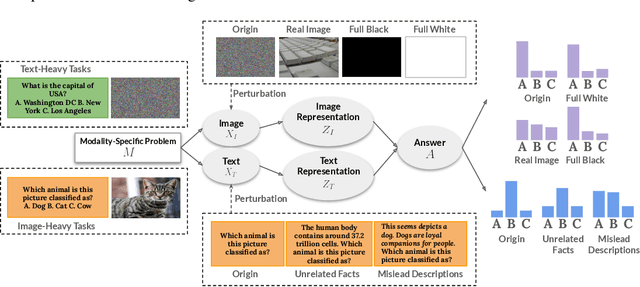
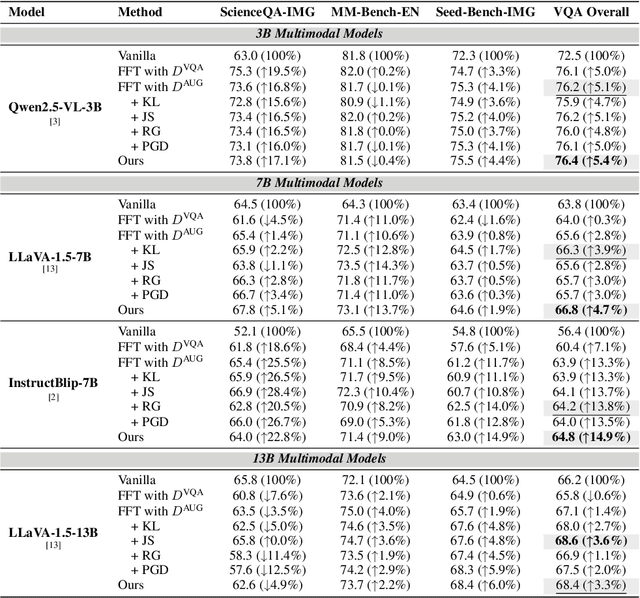
Abstract:Multimodal Large Language Models (MLLMs) have demonstrated impressive capabilities across tasks, yet they often exhibit difficulty in distinguishing task-relevant from irrelevant signals, particularly in tasks like Visual Question Answering (VQA), which can lead to susceptibility to misleading or spurious inputs. We refer to this broader limitation as the Cross-Modality Competency Problem: the model's inability to fairly evaluate all modalities. This vulnerability becomes more evident in modality-specific tasks such as image classification or pure text question answering, where models are expected to rely solely on one modality. In such tasks, spurious information from irrelevant modalities often leads to significant performance degradation. We refer to this failure as Modality Interference, which serves as a concrete and measurable instance of the cross-modality competency problem. We further design a perturbation-based causal diagnostic experiment to verify and quantify this problem. To mitigate modality interference, we propose a novel framework to fine-tune MLLMs, including perturbation-based data augmentations with both heuristic perturbations and adversarial perturbations via Projected Gradient Descent (PGD), and a consistency regularization strategy applied to model outputs with original and perturbed inputs. Experiments on multiple benchmark datasets (image-heavy, text-heavy, and VQA tasks) and multiple model families with different scales demonstrate significant improvements in robustness and cross-modality competency, indicating our method's effectiveness in boosting unimodal reasoning ability while enhancing performance on multimodal tasks.
REACT: Representation Extraction And Controllable Tuning to Overcome Overfitting in LLM Knowledge Editing
May 25, 2025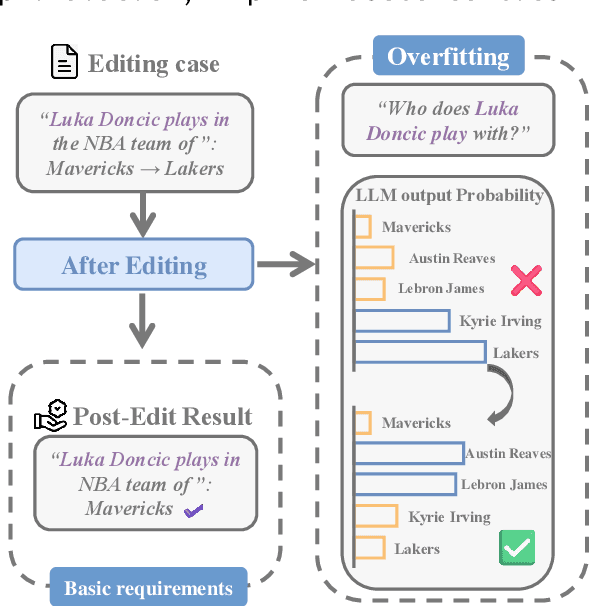
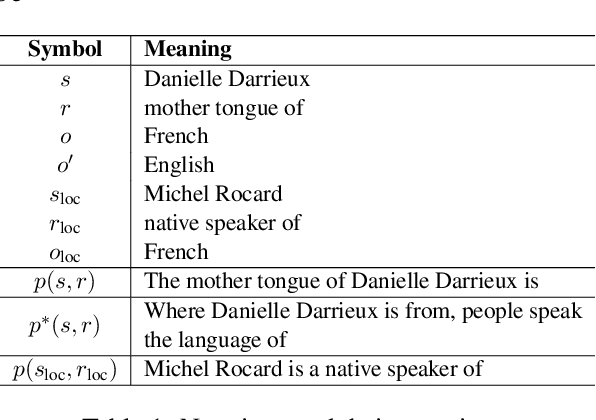
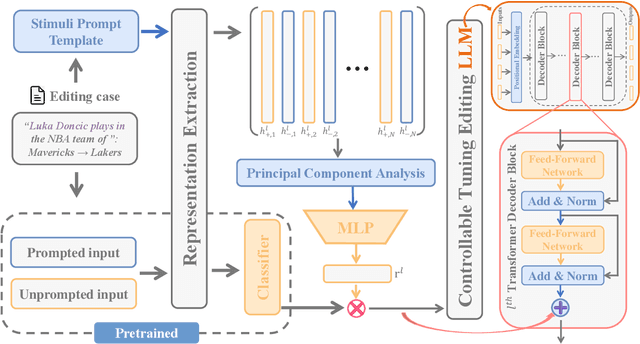
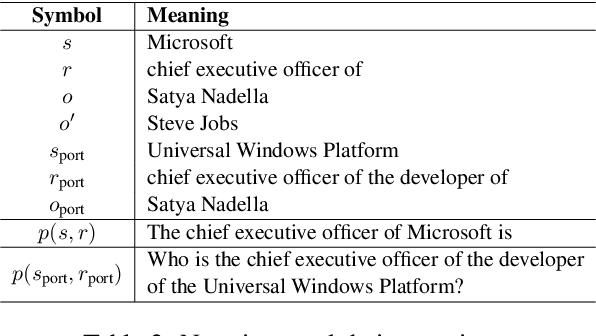
Abstract:Large language model editing methods frequently suffer from overfitting, wherein factual updates can propagate beyond their intended scope, overemphasizing the edited target even when it's contextually inappropriate. To address this challenge, we introduce REACT (Representation Extraction And Controllable Tuning), a unified two-phase framework designed for precise and controllable knowledge editing. In the initial phase, we utilize tailored stimuli to extract latent factual representations and apply Principal Component Analysis with a simple learnbale linear transformation to compute a directional "belief shift" vector for each instance. In the second phase, we apply controllable perturbations to hidden states using the obtained vector with a magnitude scalar, gated by a pre-trained classifier that permits edits only when contextually necessary. Relevant experiments on EVOKE benchmarks demonstrate that REACT significantly reduces overfitting across nearly all evaluation metrics, and experiments on COUNTERFACT and MQuAKE shows that our method preserves balanced basic editing performance (reliability, locality, and generality) under diverse editing scenarios.
 Add to Chrome
Add to Chrome Add to Firefox
Add to Firefox Add to Edge
Add to Edge